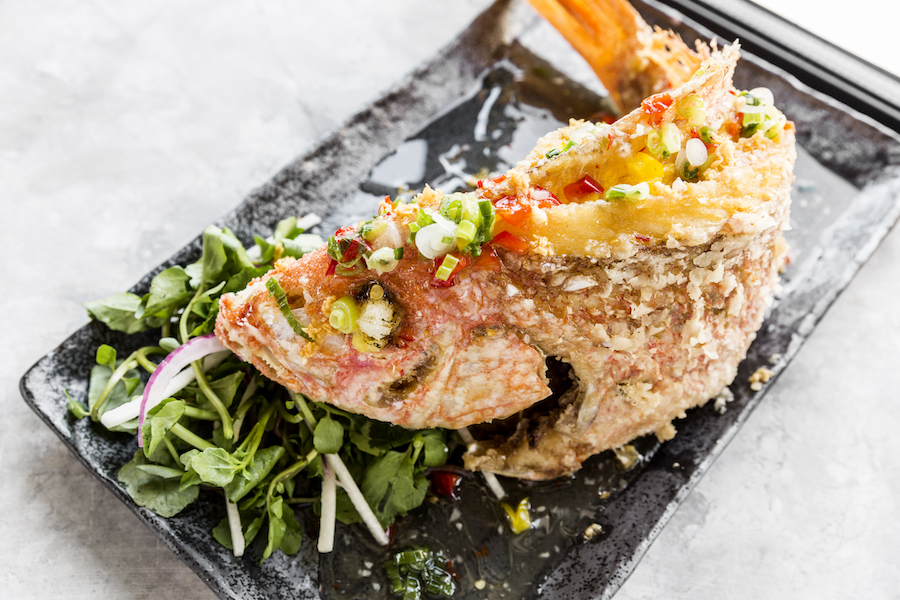There were probably some minor freakouts when longtime fans of Le Colonial, the Vietnamese-inspired Gold Coast standby, heard last year that the restaurant was closing. Luckily, it turns out that the restaurant was just changing locations. Now that it has almost finished moving into its new digs, I sat down with its team to talk about its history, the move, and what running a restaurant that celebrates “1920s French Colonial Southeast Asia” means in 2019.
Le Colonial isn’t quite a Chicago original — the oldest outpost is in New York City — but it’s been part of the Rush Street scene for so long that most people probably don’t remember that. When the restaurant first opened in 1996, Vietnamese influences weren’t nearly as common in downtown restaurants as they are now.
“Now it’s a big trend; everyone has Vietnamese flavors and bánh mì on their menus,” says Nicole Routhier, the restaurant's national culinary director. “We’re talking about 23 years ago.”
Rather than create a “fusion” version of Vietnamese food for 1990s palates, Routhier helped design a menu that represented her roots (she grew up in Vietnam and is half-Vietnamese, half-French), with an upscale approach. She spent time again in Vietnam after the country opened up to tourism in the early 1990s and wrote a book on the country’s food.
Fast-forward 22 years, and the restaurant is consistently full and has a passel of loyal customers. Certain items were so beloved that co-owner Joe King got hate mail when a dish was taken off the menu. However, the Rush Street location was simply becoming too expensive to sustain; staying would have meant paying triple the restaurant’s former rent.
King found a new location just steps away, which presented a good opportunity to refresh both the decor and the food. The new location on 57 East Oak Street won’t have the cozy second story of the original, but many design elements are identical. Guests will walk on decorative tiles made by the same artisans who crafted the distinctive floors of the Rush street location. Dark, hand-made wicker chairs fill the dining room, and many of the antiqued mirrors and light fixtures made the trip.
Patrons can expect to see many of Le Colonials’s classic dishes on the new menu. Executive chef (and partner) Quoc Luong is particularly proud of the restaurant’s chả giò (crispy spring rolls with shrimp and pork) because of the time and care that goes into them. “Original, authentic chả giò is wrapped in rice paper, but it’s very time-consuming,” says Luong. “So most restaurants don’t have the labor, and they don’t do it.” Other favorites like cari ga (curried chicken) and tom xao sate (shrimp stir fry) are sticking around, too.
Most of the menu changes will come from presentations and ingredients; expect to see more upscale and organic ingredients, like prime beef, organic tofu, and Berkshire pork.
The use of these prime ingredients points to an issue that Le Colonial has faced since day one: a racist perception that Vietnamese food can’t be expensive. “Nothing could be further from the truth — it should be the reverse,” says Routhier. “Asian cuisine in general requires a lot of prep. It’s very labor-intensive. If anything, our food should be more expensive, but people think of Chinatown. They think it’s lower grade, that it should be cheap!”
Recently, Le Colonial has been criticized on social media because of its concept. Is it inappropriate for a restaurant to celebrate a period of colonial rule built on economic exploitation of Vietnam — arguably, romanticizing violent histories? Routhier doesn’t think so.
“We cannot change history — the facts are what they are,” she says. “We have to live with it and move forward. When I was asked to join, that was the very first question I asked myself: Why as a Vietnamese person would I want to perpetuate this image? What I see is a great opportunity to bring Vietnamese culture and cuisine to the forefront.”
Le Colonial’s new location will be open by the end of February.



